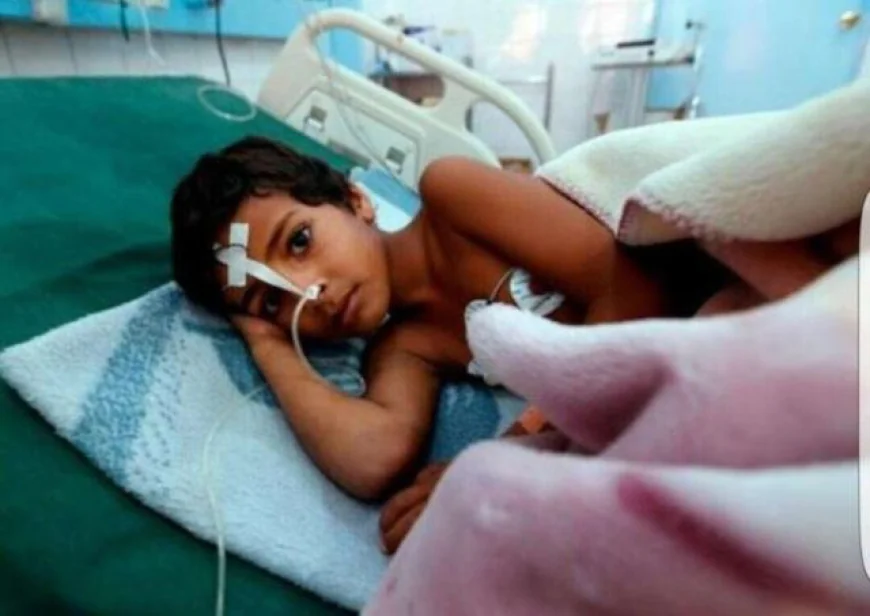Diphtheria and deadly rumors are suffocating the children of Yemen
Diphtheria and deadly rumors are suffocating the children of Yemen

Report: Rashad Al-Sayadi
Like other children who were deprived of receiving vaccines due to the stubbornness of their parents, the child Fadl Qasim (a pseudonym) arrived at the Al-Mahabsha District Hospital in Hajjah Governorate in a critical condition after being infected with diphtheria. Nurse Ammar Ali (a pseudonym) narrates the scene of the arrival of the eight-year-old child, “His parents were Next to him, terrified by the deterioration of his health condition.”
Ammar adds, “I asked the parents whether Fadel had received vaccinations against childhood diseases, and they answered in the negative.” Fadel is considered one of hundreds of children who did not receive vaccinations and were victims of rumors. According to nurse Ammar, the hospital has received approximately 110 cases since the beginning of March 2023, including 9 cases who died due to... Delayed emergency procedures.
It is the ninth year of the war, and Yemen is suffering from its repercussions at all levels, especially health and medical care, as epidemics and infectious diseases have spread more widely than before due to the scarcity of medical capabilities and the closure of approximately more than 50% of health centers that were working fully or partially. Also, displacement has contributed to The spread of many epidemics, especially in light of the lack of necessary health care needs, not to mention the failure to complete complete vaccination doses against infectious diseases such as diphtheria, tetanus, measles, hepatitis B, and tetanus.
Return of diphtheria
The latest statistics, according to the Medical Statistics Center for Diseases and Epidemiology in the city of Aden, indicate that “the number of diphtheria infections from 2020 until the beginning of 2023 in areas affiliated with the Aden government is about 1,326 cases, including 128 deaths and 591 recoveries. Abyan Governorate is considered the most widespread incubator for diphtheria, as the number of infected people reached 315 The number of deaths was estimated at approximately 27 deaths, followed by Lahj Governorate with 266 cases, including 26 deaths, then Taiz Governorate with approximately 192 cases, including 25 deaths. The number of infections in the city of Aden reached about 151 cases, of which 15 cases died.
In Hadramaut Governorate (Mukalla), the number of people infected with diphtheria exceeded about 78, including 7 deaths.
According to UNICEF, in Hajjah and Sanaa, diphtheria is one of the most widespread diseases after cholera and malnutrition, as approximately twenty-two thousand children were recorded infected with measles and diphtheria during the past year alone.
The Minister of Health in the Sanaa government, Dr. Taha Al-Mutawakkil, stated in early 2023 that about 170 children die every day due to widespread diseases and epidemics, and according to Dr. Afrah Muhammad (a pseudonym), a pediatric specialist, four cases of children infected with diphtheria arrive daily at the isolation center in Al-Sabeen Hospital.
Stages of disease development
Diphtheria is an infectious disease caused by diphtheria bacteria. The disease begins two to five days after exposure to the bacteria that causes it. Symptoms often appear gradually and begin with a sore throat and fever.
These bacteria produce a toxin that creates a thick gray or white film in the back of the throat. This thick membrane can block the airway, making it difficult to breathe or swallow. It can also cause a barking cough, and the neck may swell as a result of enlarged lymph nodes.
The toxins produced by these bacteria may spread throughout the body, causing many nerves to become ill and even paralyzed, including the nerve supplying the diaphragm, which may cause respiratory failure. The toxins of these bacteria infect the heart with mild to severe infections, and of course this results in complications that may lead to death. Diphtheria is only transmitted. From one person to another, it is the main source of its spread.
In the same context, Dr. Hanan Shuraim said that diphtheria was widespread in Yemen, but it stopped spreading in the nineties of the last century and has returned to spreading recently for general reasons such as the siege and wars that the country has been exposed to for years and the resulting poverty, displacement, and decline in the level of services, including services. Health care and the arrival of vaccination to all regions of Yemen, in addition to the media’s complete neglect of its role in educating people and making them aware of the importance of vaccination at a time when a rumor campaign was launched that combats vaccination and incites people to...
Deadly rumours
Since the outbreak of the Yemeni crisis, vaccination campaigns against infectious diseases in Yemen continue to face many rumors claiming that vaccines are unsafe. Although vaccination against infectious diseases is considered one of the most important basic pillars of health in modern medicine, rumors about vaccinations have contributed to the lack of demand for vaccination in the country. In recent years, there are many arguments, including the existence of immediate and future complications, that vaccines are unsafe, and that they have investment objectives, without citing any scientific evidence.
Diphtheria prevention guidelines
Children who suffer from malnutrition or who do not have strong immunity and who did not complete their vaccinations or were vaccinated in their childhood are more at risk of contracting the disease than others, so they must avoid crowding in infected places, and the patient must be isolated and not come into contact with him.
As for the treatment of diphtheria infection, the pediatrician at Al-Sabeen Hospital, Afrah Muhammad (a pseudonym), confirms that the patient is given an antidote to diphtheria toxin intravenously, in addition to antibiotics to eliminate the bacteria themselves. Many medications are also used according to the complications to which each individual patient is exposed. .
Dr. Afrah Muhammad says, “Prevention through vaccination prevents the disease from occurring in the first place, and even if the bacteria is transmitted to an immunized child by virtue of his occasional presence in an infected environment, his resistance is higher and he does not often develop fatal complications.”
In fact, the only way to avoid the disease is to vaccinate children and not be drawn into rumors, as there is no risk in the vaccine. Vaccinations start from six weeks until 15 years of age, and vaccines are given periodically for newborns according to the vaccine cards distributed when the first vaccine dose is taken.
*This material was produced with support from INTERNEWS as part of the ROOTED IN TRUST project in Yemen
*Quoted from “Aden Al-Ghad” website









